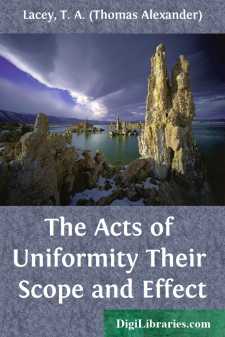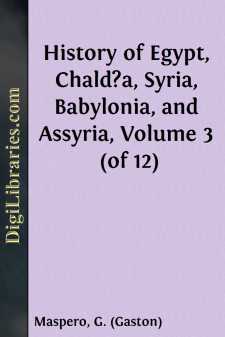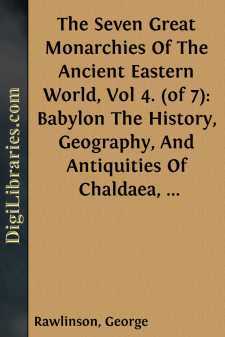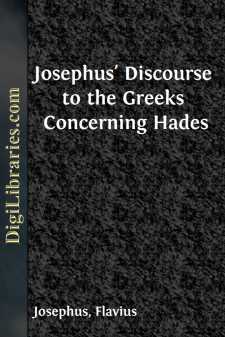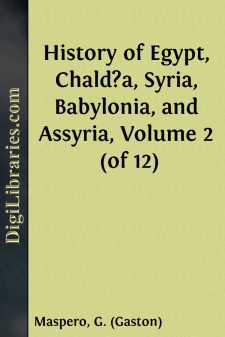History
- Africa 30
- Americas (North Central South West Indies) 50
- Ancient 68
- Asia 58
- Australia & New Zealand 8
- Canada 41
- Caribbean & West Indies 1
- Civilization 20
- Eastern Europe 12
- Europe 310
- Expeditions & Discoveries 60
- General 77
- Historical Geography 1
- Jewish 9
- Latin America 3
- Medieval 8
- Middle East 13
- Military 248
- Revolutionary 8
- Study & Teaching 5
- United States 353
- Western Europe 56
- World 13
History Books
Sort by:
by:
Lajos Kossuth
PREFACE TO KOSSUTH'S SPEECHES. Nothing appears in history similar to the enthusiasm roused by Kossuth in nations foreign to him, except perhaps the kindling for the First Crusade by the voice of Peter the Hermit. Then bishops, princes, and people alike understood the danger which overshadowed Europe from the Mohammedan powers; and by soundly directed, though fanatical instinct, all Christendom...
more...
The Acts of Uniformity are incidents in a great movement. They are far from being the most important of its incidents. Their importance has perhaps been exaggerated, and their purport is commonly misunderstood. My object is to place them in their true relation to other incidents. It is useless to study them apart; they cannot be understood except as details of a connected history. I shall confine...
more...
CHAPTER I—ANCIENT CHALDÆA The Creation, the Deluge, the history of the gods—The country, its cities its inhabitants, its early dynasties. "In the time when nothing which was called heaven existed above, and when nothing below had as yet received the name of earth,* Apsu, the Ocean, who first was their father, and Chaos-Tiâmat, who gave birth to them all, mingled their waters in one, reeds...
more...
by:
George Rawlinson
CHAPTER I. EXTENT OF THE EMPIRE. "Behold, a tree in the midst of the earth, and the height thereof was great; the tree grew and was strong: and the height thereof reached unto heaven, and the sight thereof to the end of all the earth."—Dan. iy. 10, 11. The limits of Babylonia Proper, the tract in which the dominant power of the Fourth Monarchy had its abode, being almost identical with those...
more...
CHAPTER I. JANUARY."Come then, come then, and let us bringUnto our pretty Twelfth-Tide King,Each one his several offering."Herrick'sStar Song. Dedication Festivals—New Year's Day—"Wassail"—Twelfth Night—"King of the Bean"—St. Distaff's Day—Plough Monday—Winter Games—Skating—Sword-dancing. N the old life of rural England few things are more...
more...
by:
Flavius Josephus
1. Now as to Hades, wherein the souls of the of the good things they see, and rejoice in the righteous and unrighteous are detained, it is necessary to speak of it. Hades is a place in the world not regularly finished; a subterraneous region, wherein the light of this world does not shine; from which circumstance, that in this region the light does not shine, it cannot be but there must be in it...
more...
by:
Jacob Abbott
Richard's Mother.The great quarrel between the houses of York and Lancaster.Terrible results of the quarrel.Origin of it.The mother of King Richard the Third was a beautiful, and, in many respects, a noble-minded woman, though she lived in very rude, turbulent, and trying times. She was born, so to speak, into one of the most widely-extended, the most bitter, and the most fatal of the family...
more...
CHAPTER I—THE POLITICAL CONSTITUTION OF EGYPT The king, the queen, and the royal princes—Administration under the Pharaohs—Feudalism and the Egyptian priesthood, the military—The citizens and country people. Between the Fayûm and the apex of the Delta, the Lybian range expands and forms a vast and slightly undulating table-land, which runs parallel to the Nile for nearly thirty leagues. The...
more...
CHAPTER I—SENNACHERIB (705-681 B.C.) The struggle of Sennacherib with Judæa and Egypt—Destruction of Babylon. Sennacherib either failed to inherit his father's good fortune, or lacked his ability.* He was not deficient in military genius, nor in the energy necessary to withstand the various enemies who rose against him at widely removed points of his frontier, but he had neither the...
more...
CHAPTER I. Cromwell is sick unto death.—Fears and suspicions.—Killing noMurder.—A memorable storm.—The end of all.—Richard Cromwellmade Protector.—He refuses to shed blood.—Disturbance anddissatisfaction.—Downfall of Richard.—Charles Stuart proclaimedking.—Rejoicement of the nation.—The king comes into his own.—Entryinto London.—Public joy and satisfaction. On the 30th of...
more...



